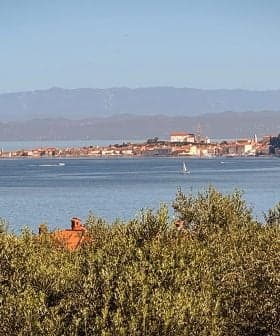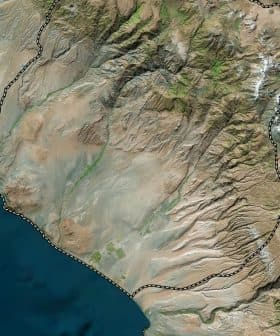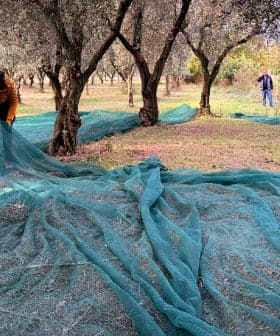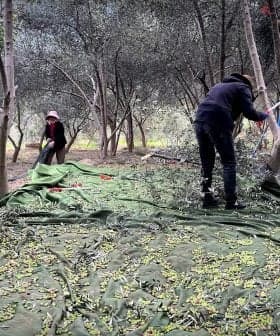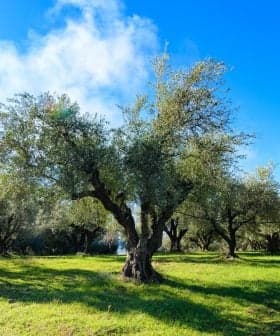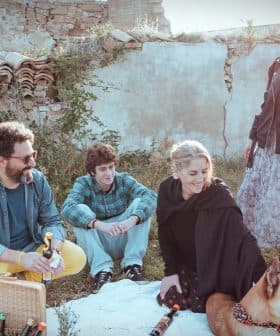Albanian Producer Pairs Local Culture, Award-Winning Quality
Bianti Danaj is betting an early harvest, skilled milling and a strong tie to Southern Albanian history will set his brand apart in crowded international markets.
 Donika Olive Oil
Donika Olive Oil Bianti Danaj, founder of Donika Olive Oil, aims to promote Albania and its endemic Kalinjot variety in the olive oil world, focusing on quality over quantity. The company won a Gold Award for their Premium brand at the 2025 NYIOOC World Olive Oil Competition, and Danaj plans to increase polyphenol content while maintaining flavor balance by skipping the decanting step in production.
Bianti Danaj, founder of Donika Olive Oil, is on a mission to put his native country of Albania and its endemic Kalinjot variety on the olive oil world map.
Despite steadily increasing olive oil production — the International Olive Council forecasted Albania would produce 30,000 metric tons in the 2024/25 crop year — Danaj said the southeastern European country would never compete with other large olive oil producers in the region in terms of quantity.
”We’re competing to have the best flavor and aroma, bitterness and pepperiness,” he told Olive Oil Times, “but we also are competing to have as many polyphenols as possible while keeping everything in balance.”
See Also:Producer ProfilesTo that end, Danaj and the rest of the team at Donika Olive Oil celebrated winning a Gold Award for their Premium brand, an organic Kalinjot monovarietal, at the 2025 NYIOOC World Olive Oil Competition. The company previously won a Silver Award for the same oil in 2024.
While the producer performed little differently between the two harvests, Danaj said an upgrade to the malaxer and better storage conditions may have contributed.

Bianti Danaj (right) is working to change the Albanian export paradigm from bulk to individually packaged hihg-quality extra virgin olive oil. (Photo — Donika Olive Oil).JPG
His milling team replaced the blades of the company’s malaxer with hollow blades that can be cooled with water, allowing them to keep the malaxing temperature at 22ºC.
“The blades remain at a constant temperature, and before they used to heat up because of the movement,” he said, allowing the paste to reach 25 ºC.
Danaj said the goal is to keep the paste from overheating and losing favorable organoleptic properties.
Once the extra virgin olive oil has been decanted and filtered, it is pumped into underground storage tanks until it is bottled to order. “The olive oil has the least amount of contact with oxygen as possible,” Danaj said.
“There is still room for improvement in storage and filtration,” he added. “We can do a much better job.”
Next year, Danaj will skip the decanting step and filter the oil immediately after production, increasing the number of filter plaques the mill uses and raising the production cost.
“Right now, we are more mission-based than profit-focused,” he said. “Of course we’re making money to sustain ourselves, but we truly believe in producing the best product… and we believed that leaving the olive oil to decant was diminishing this.”
Danaj will skip the decanting step mainly to preserve the naturally abundant polyphenols in Kalinjot olives. Donika Premium has about 800 milligrams per kilogram, far exceeding the 250 required for the medicinal claims required by E.U. Regulation 432/2012.
E.U. Regulation 432/2012
E.U. Regulation 432/2012 permits olive oil producers to claim that polyphenols help protect blood lipids from oxidative stress, provided the oil contains at least five milligrams of hydroxytyrosol and its derivatives per 20 grams.
He aims to reach 1,000 milligrams per kilogram of polyphenols while maintaining a harmonious frutiness, bitterness and spiciness.
Along with the climate and soil conditions of the southern region of Vlorë, Danaj’s team harvests the fruit early from the crowns of the trees, selecting the olives with the most exposure to the sun.
While harvesting early sacrifices quantity, it allows for more polyphenols in the resulting extra virgin olive oil.
The harvested olives are placed into baskets and transported to the mill in three-hour intervals to complete the milling process as quickly as possible.
Among the annual challenges of the olive harvest in Albania are the country’s mountainous terrain and the poor infrastructure in some rural areas.
“ The terrain here is very difficult and hilly… sometimes you can only transport olives with donkeys or horses… to a main road to take to the mill in a truck,” Danaj said. “When everyone harvests at the same time, there can be bidding wars for the limited number of donkeys and trucks.”
Due to the mountainous terrain, it is also impossible for most producers to mechanize the harvest. Fragmented land ownership means that many farmers own small plots of land, making it more difficult to achieve economies of scale.
“ We cannot [produce at scale], but we can produce very high-quality olive oil from the local variety,” Danaj said.
He believes focusing on its Albanian identity will help raise brand awareness in Donika’s export markets — the company mainly sells olive oil in the United States but is also working to enter Australia, China, Japan, South Korea and the United Kingdom — and promote Albanian extra virgin olive oil abroad more generally.
Donika is named after Donika Kastrioti, the grand princess of Albania who was born in what is now Vlorë County and married Gjergj Kastrioti.
Kastrioti, who was viewed as one of the country’s national heroes, and his wife fought for Albania’s independence from the Ottoman Empire in the mid-fifteenth century.
“ One of the reasons we started Donika is to do what Italy did in the 1980s,” Danaj said, referencing the Made in Italy initiative, which is partially credited for the country’s decades-long dominance in the U.S. olive oil market. “We’re focusing on Albania and Kalinjot, which many people have never heard of.”
Danaj said there are signs that the Albania and polyphenol-centric marketing strategies are working. He said some stores in California, where the olive oil retails at a premium price, have partly driven sales by telling the brand’s story.
“We have the footprint of success. We just haven’t done it massively yet,” Danaj said. “I think this is going to be our year, where we aim to have as many retail partners as possible [telling that story] and increase our online sales.”
Share this article



